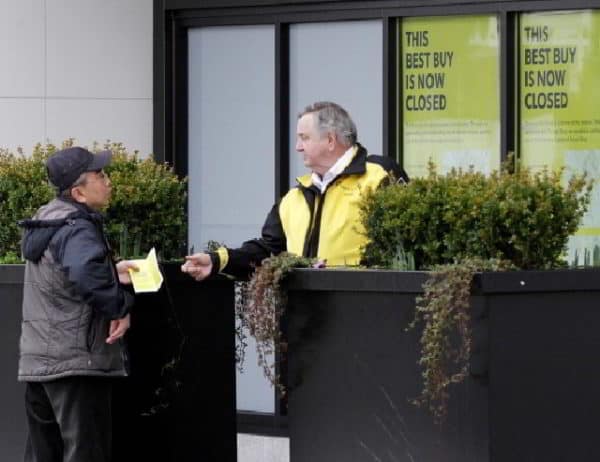
Best Buy and Future Shop closed fifteen stores on January 30th. Internet pioneer Marc Andreessen says retail stores like those that were shuttered will be a thing of the past in three or four years. Is this an exaggeration? The drum beat presaging the death of brick-and-mortar retail has long been audible and gains a little traction with each announcement of store closures, and stories of internet phenomena such as showrooming and price-matching.
Best Buy and Future Shop suddenly closed 15 stores on Jan. 30, a move the parent company describes as part of its long-term strategy for “optimization” of its retail footprint. So long-term was the strategy that 900 employees learned of their unemployment by showing up for work the morning of Jan. 31 to read pre-printed signs hanging in front doors affirming each store’s permanent closure.
Stories like these tend to shade healthy skepticism about premature announcements for the death of retail into an ever more certain death watch. This was recently reiterated by internet pioneer Marc Andreessen, who went the extra mile of attaching a timeline of “the next three to four years”. We might wonder what he knows that retailers and consumers only suspect. “Retail guys are going to go out of business and ecommerce will become the place everyone buys. You are not going to have a choice,” he says. “We’re still pre-death of retail, and we’re already seeing a huge wave of growth. The best in class are going to get better and better. We view this as a long term opportunity.”
Hmm.
Accompanied by articles on the rise of zombie malls, it’s clear that this story isn’t merely unfolding on-line like a videogame, but that it will have a very real effect on commercial real estate, not to mention the shipping industry. The state of retail mall space was hilariously summed up recently by Cleveland-based DDR Corp. CEO Daniel Hurwitz, who cheerily spun the issue: “I don’t think we’re overbuilt, I think we’re under-demolished,” he said.
The skeptical consumer may also wonder, “Real-world retail has already been eroded by on-line sellers who offer free shipping. How much worse can it get?” Who are these “best in class” that Andreessen refers to, and what is their “long-term opportunity”?
What Andreessen sees coming so imminently, perhaps, is the use of Big Data by marketers who will progressively erase the boundary between advertising as we know it and the targeting of consumers through social media. Facebook’s FBX marketplace, tweaked by search re-targeters like Chango, is a high-profile recent example of what social media will look like as companies that have offered an essentially free service in the name of building up a huge user database decide to monetize that database’s information. You either admire the efficiency of these tailor-made ads while you’re browsing someone else’s photo album or you find them a little creepy. We’re just at early stages.
Consumers may also ask, “How will I buy shoes or a TV without consulting the expertise of a sales associate?” The need to physically interact with products and chat with a cheesemonger should perhaps not be underestimated. At least, not when it comes to cheese. Shoes, on the other hand, are in trouble, given the ability of companies like Fab, ShoeDazzle, Zappos, or Shopify to intelligently satisfy not only the tactile, look-and-see needs of shoppers, but also their social demands.
While savvy retailers learn to use mobile-enhanced technology to supply nuts-and-bolts information that sends a shopper to Google instead of out the door, and bakeries notice an overall sales uptick from using social media to announce the availability of a fresh batch of croissants to its Twitter followers, big retail certainly will continue to die, regardless of its ability to adjust its footprint.
As Andreessen predicts, we are entering a period of retail Darwinism. But will retail really die off, completely and totally? A more plausible scenario is that it will go the way of vinyl records: pundits will declare it dead, its “death” will become commonly acknowledged, and its physical near-death at the hands of a digital replacement will be followed by a kind of dignified and quite healthy afterlife. And it will be appreciated for what it is by those who always truly loved it.
Leave a Reply
You must be logged in to post a comment.




 Share
Share Tweet
Tweet Share
Share




Comment